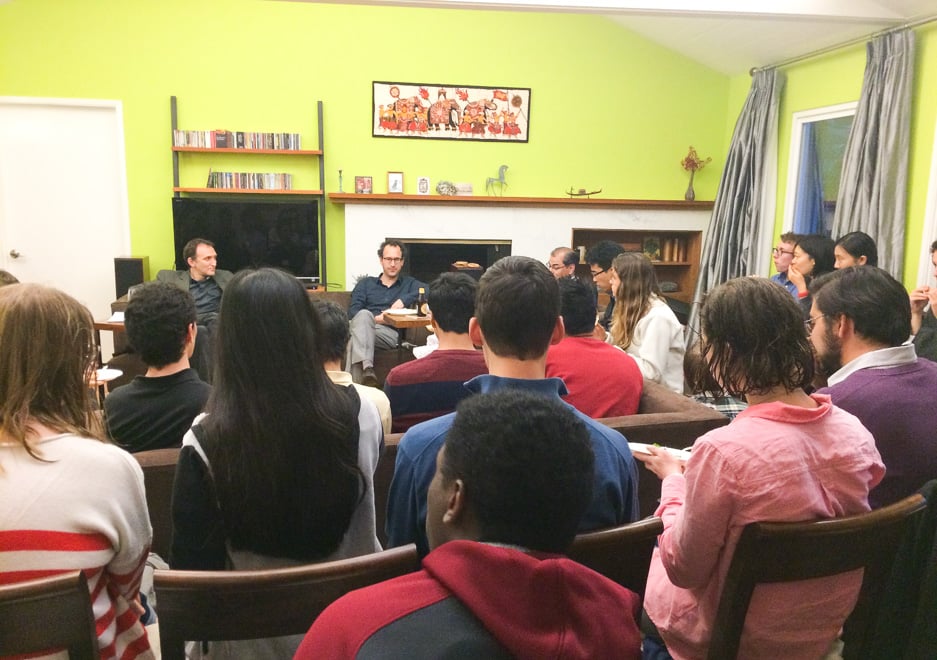At least 50 students crowded into the home of Nadeem Hussein, the dean of FroSoCo and professor of philosophy, last Friday night for a lively discussion between Hussein and fellow acclaimed professors in the humanities: Joshua Landy, professor of French; Andrew B. Hammond, professor of French and director of Structured Liberal Education (SLE); and Dan Edelstein, chair of the Division of Literatures, Cultures and Languages (DLCL) and Resident Fellow of the Humanities House. The discussion centered around the question of “What is the point of the humanities?”
Hussain, the host and moderator of the discussion, began by questioning and challenging the empirical basis of Landy and Edelstein’s research in the humanities, asking “What is it about a humanistic approach that make it different from the sciences? What kind of data do you use?”
“My method would be, say, reading twenty books and picking out quotes as ‘data,’ and present an argument about the evolution of genre,” Landy said, playing along.
“I’m not basing it on whether one has X, the other has Y, X is less than Y, I rest my case,” Landy added, more seriously elaborating on his methods. ”I do think that reading, say, psychology research on human responses to certain stimuli and metaphors can help me to generalize.”
“Does that mean that in an ideal world, if you could do it with a scientific method, you would?” Hussain responded.
“To me, that argument reminds me of a friend who used to say, ‘What if there’s a magic pill that can tell us everything we need to know?’” Landy said. “And my response would be, well, there isn’t a magic pill now. We don’t have a numerical method that could tell us about the impact of a metaphor, for example. And if there is a magic pill, tell me, but until then this approach — the humanistic approach — is the best we’ve got.”
“It’s not like the ‘Hitchhiker’s Guide to the Galaxy,’ where the answer is 42,” Edelstein said. “Einstein himself said, ‘Not everything that counts can be counted, and not everything that can be counted counts.’
“In some cases, there is just too much data,” he added. “We’re talking about why the French Revolution turned from the rights of man into chopping people’s heads off — that’s at least 30 years’ worth of explanations and day-to-day life.”
Aside from methodology, the debate turned to whether findings in the humanities speak to human beings in general or rather more personal, particularistic perspectives. Edelstein defended the study of history and its ability to answer grander questions about human society with a metaphor of his own, noting the links between his own work in the French Revolution and politics.
“Well, history is like Russian dolls,” Edelstein said. “By Russian doll I mean, the biggest question is, why do some democracies lead to total nightmares? Why do democracies like demagogues? So we decided to take a look at historical examples and patterns, which leads into the French Revolution.”
“And that leads into the question of why 75 speeches in the French Parliament ended in them deciding to kill the king,” Edelstein added. “And if you can answer that convincingly, you have something to say about the bigger questions.”
Turning to the point of the humanities for undergraduate students, the audience questioned the panel about the room for student creativity and engagement.
“Doesn’t the lack of independent thought in introductory-level science classes say more about the quality of instruction in the sciences, rather than the greater value of the humanities for an undergrad?” an audience member asked.
“But you see, I think that’s a serious question,” Hussain answered. “I try to make sure that none of my students in PHIL 1 come out with an original thought.”
“To me, introductory philosophy is a lot like introductory physics — you need to take several introductory courses to have some idea of the ideas and approaches in contemporary physics or philosophy to prepare you to eventually add something to those fields after taking several more courses,” He explained.
Other comments from the floor also defended scholarship in the sciences.
“The testable product of science is what appeals to me — it can answer a set of questions and moves on to a different set of questions, whereas the humanities seem to ask the same sets of questions about settled topics,” a student commented.
“To me, history is not just about answering a set of questions,” Edelstein responded. “There’s the sheer factor of wonder and curiosity — the sense of absurdity that sometimes comes as you walk about your daily business. Studying the humanities, studying how other people lived in a different time and throughout the ages, is meaningful in an existential sense.”
“For me, I most remember what [Edelstein] said about how the humanities help us to live amid uncertainty — that’s the most fundamental thing to me,” Eliza Wells ‘19, a prospective religious studies major, reflected after the event.
And though the evening fittingly ended without a final answer to an age-old question — “What is the point of the humanities?” — the healthy turnout and the lively dialogue was a sign that plenty of people cared.
Contact Fangzhou Liu at fzliu96 ‘at’ stanford.edu.
